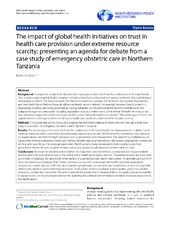| dc.description.abstract | Background Through the nearly three decades that have passed since the Alma Ata conference on Primary Health Care, a wide range of global health initiatives and ideas have been advocated to improve the health of people living in developing countries. The issues raised in the Primary Health Care concept, the Structural Adjustment Programmes and the Health Sector Reforms have all influenced health service delivery. Increasingly however, health systems in developing countries are being described as having collapsed Do the advocated frameworks contribute to this collapse through not adequately including population trust as a determinant of the revival of health services, or are they primarily designed to satisfy the values of other actors within the health care system? This article argues there is an urgent need to challenge common thinking on health care provision under extreme resource scarcity. Methods This article sets out to discuss and analyze the described collapse of health services through a brief case study on provision of Emergency Obstetric Care in Northern Tanzania. Results The article argues that post the Alma Ata conference on Primary Health Care developments in global health initiatives have not been successful in incorporating population trust into the frameworks, instead focusing narrowly on expert-driven solutions through concepts such as prevention and interventions. The need for quantifiable results has pushed international policy makers and donors towards vertical programmes, intervention approaches, preventive services and quantity as the coverage parameter. Health systems have consequently been pushed away from generalized horizontal care, curative services and quality assurance, all important determinants of trust. Conclusions Trust can be restored, and to further this objective a new framework is proposed placing generalized services and individual curative care in the centre of the health sector policy domain. Preventive services are important, but should increasingly be handled by other sectors in a service focused health care system. To facilitate such a shift in focus we should acknowledge that limited resources are available and accept the conflict between population demand and expert opinion, with the aim of providing legitimate, accountable and trustworthy services through fair, deliberative, dynamic and incremental processes. A discussion of the acceptable level of quality, given the available resources, can then be conducted. The article presents for debate that an increased focus on quality and accountability to secure trust is an important precondition for enabling the political commitment to mobilize necessary resources to the health sector. | en_US |

